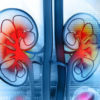Food Allergy Treatment Near You in New Jersey
 Over a quarter of Americans have some kind of food allergy. While allergies can be potentially fatal if they are not diagnosed early, effective management can help patients plan meals safely to avoid severe reactions. Bergen Medical Associates is home to a team of over 40 board-certified practitioners, including specialists in allergy and immunology. They serve patients from multiple locations near you in northern New Jersey with expert food allergy treatment and management.
Over a quarter of Americans have some kind of food allergy. While allergies can be potentially fatal if they are not diagnosed early, effective management can help patients plan meals safely to avoid severe reactions. Bergen Medical Associates is home to a team of over 40 board-certified practitioners, including specialists in allergy and immunology. They serve patients from multiple locations near you in northern New Jersey with expert food allergy treatment and management.
What Is the Immune System?
The immune system is responsible for protecting the body against threats. It identifies pathogens such as bacteria, viruses, and other invaders, then triggers a response to eliminate them. Many common symptoms of sickness, including fever, nausea, and a runny nose, are immune responses to kill pathogens or evacuate them from the body.
What Is a Food Allergy?
Food allergies occur when a person’s immune system overreacts to a harmless food protein, called an allergen. The immune system triggers a body-wide response, called an allergic reaction, to eliminate the allergen. While the food protein itself is harmless, a severe allergic reaction can cause potentially fatal complications.
What Are Food Allergy Symptoms?
Food allergy reactions vary from mild to severe, sometimes in the same individual. A food that initially provokes only mild to moderate symptoms may cause more severe reactions on a different occasion. Symptoms typically appear within five to 30 minutes of eating a problem food, though in some cases they may appear hours later. The most common symptoms include:
- Reddened skin
- Rashes or hives
- Nausea and vomiting
- Stomach cramps
- Diarrhea
- Chest tightness
- Wheezing or coughing
- Tight or hoarse throat
- Difficulty swallowing
- Swelling of the tongue
Very severe allergic reactions cause a condition known as anaphylaxis. This is a serious reaction triggered by the over-release of immune hormones, called histamine, leading to system-wide shock. Anaphylaxis can occur within seconds or minutes of exposure to an allergen. Its symptoms include the above-listed symptoms, in addition to:
- Shortness of breath
- Inability to swallow
- Reduced blood pressure
- Increased heart rate
- Pale or blue-tinged skin
- Dizziness or feeling faint
- Feelings of doom
- Loss of consciousness
Anaphylactic shock is considered a medical emergency. If left untreated, it can cause respiratory problems, circulatory collapse, and heart or organ failure. Immediate medical attention is necessary to save a person’s life.
About 20% of patients also experience biphasic anaphylaxis. This is a second wave of symptoms that occur hours or even days after the initial reaction has passed. Patients who have experienced anaphylaxis should remain alert afterward in case of a second reaction.
What Causes Food Allergies?
A person can have allergic reactions to any type of food. Nine foods, however, are responsible for over 90% of food allergies in the United States. These include:
- Milk and dairy
- Eggs
- Peanuts
- Tree nuts
- Soy
- Wheat
- Fish
- Shellfish
- Sesame (also called tahini)
Food allergies may develop at any point in life. Some people have allergies starting from early childhood, while others only develop allergies in adulthood. Patients can also grow out of an allergy. If a person has other related conditions, including asthma, eczema, or hay fever, they are likely to develop a food allergy as well.
Genetics also plays a role. If a person’s parent, sibling, child, or other close family member has a food allergy, then they are also at greater risk of developing the same allergy.
How Are Food Allergies Diagnosed?
Most food allergy diagnoses occur after a person has a negative reaction to food. Some patients may seek a diagnosis proactively if a family member has a severe food allergy. Food allergy diagnosis is performed by an immunologist or certified allergist using a few different methods:
- Medical history: The allergist interviews the patient on their reaction, including what they ate and how much, how long it took for a reaction to develop, and what symptoms developed. They may also investigate the patient’s family history for similar allergies.
- Skin prick tests: A liquid containing trace amounts of a food allergen is placed on the skin of the arm or back. The allergist then pricks the skin under the liquid using a sterile probe. If the patient is allergic, a tiny bump will develop at the prick site.
- Blood tests: The allergist draws a small blood sample to be tested in the laboratory. The lab test measures the amounts of immunoglobulin E (IgE) antibodies that are present. Large amounts of IgE antibodies may indicate an allergy.
- Oral challenge: The patient consumes tiny amounts of the suspected trigger food, with dosages increasing over time. The dosing is followed by a few hours of close observation. This test is most often used if skin prick or blood tests are inconclusive.
Positive test results do not always mean that the patient definitively has a food allergy. Negative results, however, can be useful for ruling out possibilities.
What Food Allergy Treatments Are Available?
Once diagnosed, the most common treatment for food allergies is to avoid the trigger. Patients must be careful to read ingredient lists for known allergens before consuming a food. A certified nutritionist can provide advice and help patients develop a diet that avoids food triggers.
Patients must also be careful of cross-reactivity. People who have a reaction to one food are more likely to react to similar foods. Someone allergic to shrimp, for example, may also react to crab and lobster. Someone who has problems with one type of nut may have similar problems with other nuts. Patterns of cross-reactivity are not always straightforward. Patients should work with a certified immunologist to identify cross-reactivity and avoid unexpected reactions.
Anaphylaxis is treated with epinephrine injections. These deliver a measure of epinephrine, or adrenaline, which counteracts histamine to quickly reverse symptoms of anaphylaxis. Injections are most effective when administered immediately after anaphylaxis begins, and repeated doses are sometimes necessary. Patients should seek emergency care even after receiving epinephrine.
Find Allergy Care Near You in New Jersey
Unexpected food allergies can be frightening. With the right preparation and medical care, however, patients can avoid serious complications and eat responsibly. Bergen Medical Associates provides care for a wide range of medical needs, including immunology and nutrition. To learn more about food allergy treatment near you in northern New Jersey, request an appointment today. We have locations in Emerson, Montvale, Northvale, Paramus, and Ridgewood, NJ, making it easy to find treatment near you.












